|
Everyone has experienced anal itching at some point in their life. Anal itching often indicates an inflammation around the anus (perianal area), that may accompany with a burning feeling or pain sometimes. The itchiness is usually aggravated by direct scratching; self-care measures are very helpful to relieve the symptom.
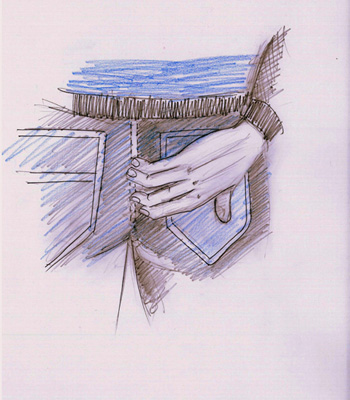
When itchy anus appears, it is necessary to do some self-care measures for symptom relief.
|
Self-care and prevention for itchy anus
 Avoid scratching: be aware of forming an itch-scratch cycle, scratching only makes the symptom worse. Many people can't stop scratching during sleep, it is advised to keep their fingernails short and wear gloves at night. Or they can discuss with doctors about taking an antihistamine. Avoid scratching: be aware of forming an itch-scratch cycle, scratching only makes the symptom worse. Many people can't stop scratching during sleep, it is advised to keep their fingernails short and wear gloves at night. Or they can discuss with doctors about taking an antihistamine.
 Keep clean: rinse the anal area after bowel movements, which can prevent the fecal remnant from irritating the anus. It should be noted that excessive washing, hard scrubbing or rubbing will aggravate the itching, so be gentle to the anal area. Moist pads such as baby wipes are better than toilet paper for cleansing the area. Keep clean: rinse the anal area after bowel movements, which can prevent the fecal remnant from irritating the anus. It should be noted that excessive washing, hard scrubbing or rubbing will aggravate the itching, so be gentle to the anal area. Moist pads such as baby wipes are better than toilet paper for cleansing the area.
 Reduce irritations: things like scented soaps, talcum powder, bubble bath, genital deodorants or disinfectants are stimulating to the anal area, water and mild soap are well enough to keep the area clean and without irritation. Reduce irritations: things like scented soaps, talcum powder, bubble bath, genital deodorants or disinfectants are stimulating to the anal area, water and mild soap are well enough to keep the area clean and without irritation.
 Keep dry: change underwear every day, and wear loose clothing to help keep the area dry. Tight underwear and longtime sitting can induce sweating easily, and so should be avoided. If excessive sweating is still a problem, use non-scented drying powders in the area. Keep dry: change underwear every day, and wear loose clothing to help keep the area dry. Tight underwear and longtime sitting can induce sweating easily, and so should be avoided. If excessive sweating is still a problem, use non-scented drying powders in the area.
 OTC products: many OTC products like ointments, creams, and gels are available for relieving itchy anus. When applying them, it should be covered in a thin layer around the anal region. Keep in mind that the products are for short term only; certain ingredients of the products may irritate the skin and make the problem worse. OTC products: many OTC products like ointments, creams, and gels are available for relieving itchy anus. When applying them, it should be covered in a thin layer around the anal region. Keep in mind that the products are for short term only; certain ingredients of the products may irritate the skin and make the problem worse.
 Maintain healthy bowel movements: irregular bowel movements or passing sticky or hard stools do not favor the healing of itchy anus. Individuals should consume adequate amount of dietary fibers and water. Some foods are known to worsen anal itching, such as spices, beer, coffee and daily products, pay attention to these food triggers and eliminate them from your diet. Gas-producing food should also be limited. Maintain healthy bowel movements: irregular bowel movements or passing sticky or hard stools do not favor the healing of itchy anus. Individuals should consume adequate amount of dietary fibers and water. Some foods are known to worsen anal itching, such as spices, beer, coffee and daily products, pay attention to these food triggers and eliminate them from your diet. Gas-producing food should also be limited.
In general, anal itching is unlikely to be a serious symptom, and usually resolves within a week. Pruritus ani is the medical term for anal itching, which means persistent itch feeling around the anus with a strong urge for scratching. The itchy feeling usually gets worst at night or just after a bowel movement, others like hot environment, sweating, tightfitting pants and stress can also make it worse.
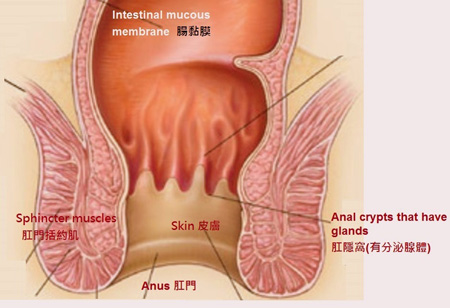
Structures of the anus
|
Causes of itchy anus
Persistent anal itching has many causes, a detail checkup to identify the underlying causes is important for long term relief. If the anal itching has last for one or two months, or accompanies with bloody stool, don't hesitant to consult your doctor. Some of the itchy conditions that need medical attention include:
 Anal conditions: hemorrhoids, anal fissures (small crack in the anal skin), anal fistulas (abnormal passageways surrounding the anus), skin tags (abnormal local growth of anal skin) or tumors; Anal conditions: hemorrhoids, anal fissures (small crack in the anal skin), anal fistulas (abnormal passageways surrounding the anus), skin tags (abnormal local growth of anal skin) or tumors;
 Skin conditions: conditions like psoriasis, eczema and dermatitis can appear around the anus that leads to the itchy symptom; Skin conditions: conditions like psoriasis, eczema and dermatitis can appear around the anus that leads to the itchy symptom;
 Infections: herpes, or other sexually transmitted diseases, scabies, fungal infections or parasites like threadworms; Infections: herpes, or other sexually transmitted diseases, scabies, fungal infections or parasites like threadworms;
 Systemic diseases: diseases that cause generalized itching such as diabetes, liver problems, lymphoma, anemia and thyroid disease may appear more intense in the anal area sometimes. Systemic diseases: diseases that cause generalized itching such as diabetes, liver problems, lymphoma, anemia and thyroid disease may appear more intense in the anal area sometimes.
 Side effects: antibiotics or steroid medications may cause side effects like diarrhea, stool incontinence, or yeast infection that irritate the anus. Side effects: antibiotics or steroid medications may cause side effects like diarrhea, stool incontinence, or yeast infection that irritate the anus.
With appropriate treatment and self-care measures, most anal itching can be resolved successfully. However, even after months of active treatment, a few individuals are likely to have anal itching again. Management on an ongoing basis is thus required for them, traditional Chinese medicine (TCM) can be part of the management.
Chinese herbal prescriptions for itchy anus
From a TCM holistic view, anal condition is associated with internal organs. The anus is the lower exit of the large intestine, and is responsible for excreting digestive wastes; the spleen plays an important role in stool formation; the kidney dominates the opening and closing of the anus; and meridians of the large intestine and the lungs pass through the anal region. All of them can affect the anus to function.
It is claimed that development of itchy anus has both internal and external origins. Individuals are usually in a disharmony state such as damp-heat accumulation, organ weakness or blood deficiency that makes the anal region susceptible to external irritations. When external pathogens take advantage to stimulate the anus, itching will develop. TCM physicians will check the patients in detail and identify a disharmony pattern for diagnosis. The remedies are designed to resume the internal harmony and eliminate local pathologies.
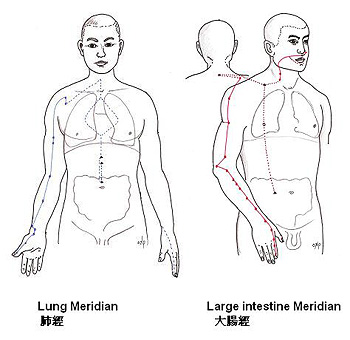
The lung and large intestine meridians
|
TCM treatment for anal problems is mainly oral prescriptions, however due to specific location and structure of the anus, topical applications are usually combined. Purging damp-heat and replenishing blood and qi (vital energy) are two important therapeutic principles for anal problems.
Below are common disharmony patterns of anal itching and the herbal remedies:
External wind heat invasion
Severe anal itching that last for a short time, with a hot sensation, and tends to be aggravated in hot environment. The anal region is red and may have skin rashes or cracks, individuals usually accompany with irritability, a bitter taste in mouth, constipation and yellowish urine. The tongue coating is yellowish, and the pulse is rolling or rolling and rapid. The remedy should aim to disperse wind and clear heat.
Sample of prescription: modified Four-substance Wind Dispersing Drink
Blood deficiency generated wind and dryness
Severe anal itching that last a long period of time, the anal region is rough, dry, and thickened. There may have cracks, scratching or bleeding marks. Individuals usually accompany with mouth dryness, a thin physique and poor sleep. The tongue is red, and the pulse is thready and rapid. The remedy should aim to nourish blood and disperse wind.
Sample of prescription: modified Angelica Root Drink
Damp-heat accumulated in anus
The anal area is itchy, moist and painful, which are aggravated by body movement and scratching. Individuals usually accompany with a falling sensation in the anal area, fatigue, abdominal distention and poor appetite. The tongue is red with yellow greasy coating, and the pulse is rolling and rapid. The remedy should aim to clear heat and dispel dampness.
Sample of prescription: modified Wind Dispersing Powder plus Two-wonder Powder
External herbal remedies for itchy anus
For itchy anus, physicians like to use external remedies such as herbal washes, creams and powders to relieve the localized irritations and stop itching. The herbs are selected to promote the circulation, reduce inflammation, arrest excessive secretions, stop pain and itchiness, lubricate dryness and promote the healing process.
 |
Sopora root (15g), processed alum (3g), belvedere fruit (10g), arnebia root (10g), natural indigo (10g), wild chrysanthemum (10g). After decocted, add 10ml of rice vinegar into the solution. |
 |
Sopora root (30g), common cnidium fruit (20g), Dahurian angelica root (12g), wild chrysanthemum (20g), amur corktree bark (20g), belvedere fruit (20g), acorus (15g) and honeysuckle flower (15g); for newly developed cases add in pricklyash peel (10g) and borneol (5g, dissolve directly in the decoction); for chronic and persistent cases add in angelica root (10g), sessile stemona root (10g) and dried tangerine peel (10g). This is suitable for anal itching with skin rash. |
 |
Chinese rhubarb root, duckweed, sopora root, garden burnet root, schizonepeta herb, and common cnidium fruit, for 30g each. This is suitable for wet anal itching. |
 |
Duckweed, Siberian solomonseal rhizome, sessile stemona root, argy wormwood leaf, and Dahurian angelica root, for 30g each; pricklyash peel (10g). This is suitable for anal itching with dry and rough skin changes. |
 |
Angelica root, fleeceflower root, ledebouriella root, puncturevine caltrop fruit, common cnidium fruit, belvedere fruit and dictamnus root bark, for 30g each. In case if the localized skin is thickened and darkened, add red peony root and common burreed tuber for 30g each. |
Application: soak the herbs in water for 20 minutes, cook for 20 minutes to make 2000ml of solution. Steam the anal region with the hot solution; after the water cool down, soak for 10 minutes more. Do this after bowel movements or before going to bed. After finished, pat gently to dry and then apply on a thin layer of protectant, such as calamine solution for drying or herbal cream for lubrication. One pack of the herbs can be used for 2 to 3 times.
Acupuncture therapy to stop anal itching
Acupuncture therapy not only can eliminate the localized irritations to stop itching, it also regulates the internal organs and the meridian flow to facilitate the healing process. It is a safe method that will not cause adverse reactions like oral or topical drugs. Below are two acupuncture protocols for anal itching.
Protocol (I)
Selected body points: er bai (Ex-ue2), shen shu (Bl 23), da chang shu (Bl 25), pi shu (Bl 20), chang qiang (Gv 1), cheng shan (Bl 57), and tai xi (Ki 3). Apply with even techniques, stimulate daily, twelve times are as one course of treatment.
Protocol (II)
Selected body points: chang qiang (Gv 1), qu chi (Li 11), san yin jiao (Sp 6), xue hai (Sp 10), and he gu (Li 4). Apply with reduction techniques, and retain the needles for 10~15 minutes. Stimulate daily, seven times are as one course of treatment.
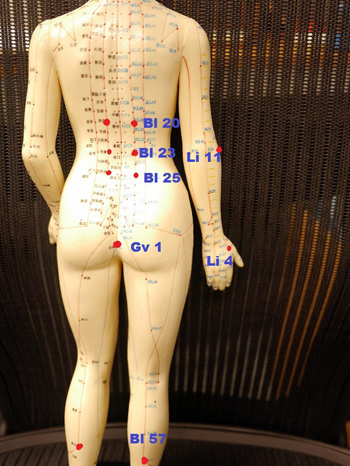
Acupuncture points for itchy anus
|
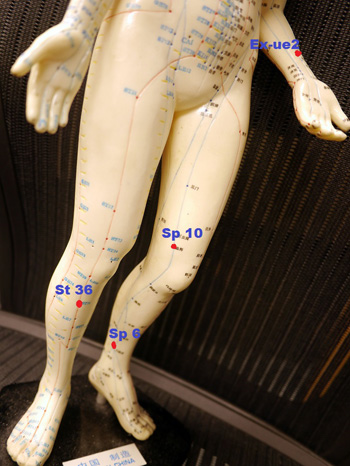
Acupuncture points for itchy anus
|
TCM dietary advice for anal itching
Eating habits play an important role for anal itching prevention and healing. Reports showed that certain foods and drinks like tomato, chocolate, citric fruits, spices, coffee, peppers, tea, beer, milk and dairy products can induce or aggravate anal itching. The trigger foods may vary from person to person, so individuals should pay attention to identify them out from daily diet. Others like regular bowel movements, drinking plenty of water, reducing mental stress and proper posture to avoid putting extra pressure on the abdomen are also necessary.
From a TCM perspective, anal itching is mostly associated with wind, dampness and heat irritations that usually pass down from the digestive tract. The pathogens can easily be generated and accumulated when the spleen and stomach are under-functioning. It is advised to keep the daily meals light, juicy and easily digested, eat in regular time and in appropriate amount each time, so as to reduce the workload of the digestive system. Spicy and hot property foods like pepper, chili pepper, garlic, onion, leek, ginger, coriander and mutton should be limited. Cigarette, wine, greasy or deep fired, frozen and uncooked, herbal tonics and gas producing foods should also cut back. Foods like water chestnut, mung bean, purslane, loofah, wax gourd, white fungus, pumpkin, lotus root, sugar cane, fig, banana and fish help cleanse the digestive tract and regulate the bowel movements, which are beneficial.
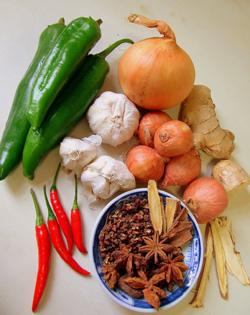
|
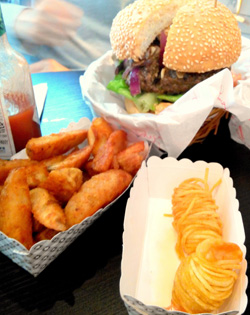
|
|
|
Individuals with itchy anus should limit the consumption of hot spicy, dehydrated, deep fired or greasy food.
|
Below are some healthy recipes for anal itching:
 |
Prepare honeysuckle flower (3g), couch grass rhizome (15g), and coix seed (200g). First, decoct the honeysuckle flower and couch grass rhizome for 20 minutes to make a juice, then cook the juice, coix seed with 1000ml of water in low heat, when the coix seed is tendered and the liquid becomes thick, turn off the heat and serve in warm. |
 |
Prepare mung bean (30g) and dried lily bulb (30g), boil with water to make a sweet dessert. |
 |
Prepare coix seed (5g), and ten pieces of water chestnut (peeled and finely chopped), boil with water to make a sweet soup. |
 |
Prepare mung bean (60g), and liquorice root (5g), boil to drink. |
 |
Fresh reed rhizome (100g), squeeze juice and drink several times a day. |
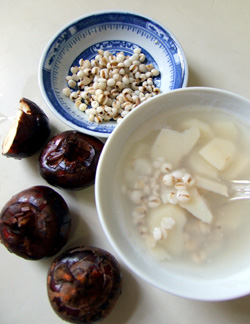
|
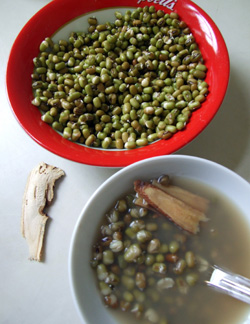
|
|
|
Coix seed and water chestnut sweet soup
|
Mung bean and liquorice root drink
|
|